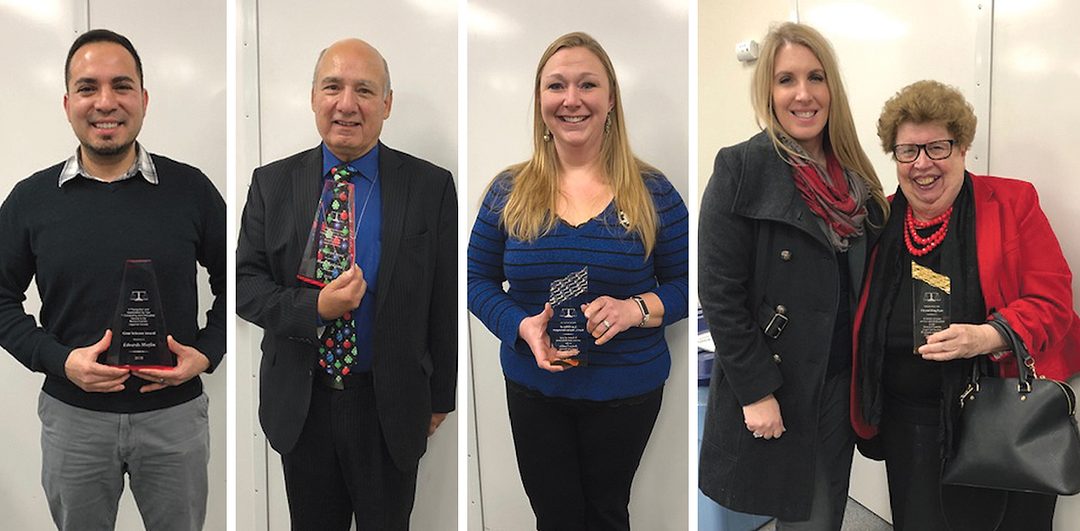
Home » Legal Aid group honors area attorneys’ contributions
Legal Aid group honors area attorneys’ contributions

January 14, 2019
Each year about 4,000 people reach out to the Benton-Franklin Legal Aid Society for legal assistance.
And each year Tri-City area attorneys donate their time to help those they can.
The nonprofit society recently held its annual awards luncheon to recognize attorneys who significantly contributed to the organization’s efforts to find pro bono legal representation for those who otherwise wouldn’t be able to afford it.
About 100 attended the function, including attorneys and judges.
“The Benton Franklin Bar Association is one of the best bars in the state. They really do go above and beyond the call of duty,” said Barbara Otte, executive director of Benton-Franklin Legal Aid Society. “They provide more full representation for low-income clients than a lot of other counties in the state and they support our program a lot with all of their volunteering.”
In 2017, area attorneys collectively donated 1,790 hours, the equivalent of about $358,000 (assuming $200 per hour) in billable hours, Otte said.
That’s up from $303,000, or 1,515 hours, in 2016.
Otte said Legal Aid receives 300 to 400 walk-ins and calls per month from those reaching out for help. The majority are family law-related cases.
Of those, 97 were assigned full representation last year, with 336 clients receiving some form of free legal counsel through the society.
According to Otte, there are about 350 active attorneys in Tri-Cities, three quarters of whom comprise the network she turns to when seeking counsel for clients.
Otte said having a legal community dedicated to her agency’s cause is the foundation of its success.
The Benton-Franklin Legal Aid Society’s 2018 awards went to:
- Edwardo “Eddie” Morfin of Morfin Law Firm in Kennewick received the Schuster Award. The late Gene Schuster was an attorney who had a hand in starting the legal aid program, Otte said. The recipient is usually a younger attorney who’s gone above and beyond by either having taken the most cases that year or helped out with the society’s free legal counsel clinics.
- Mario Ledesma of Ledesma Law Offices in Richland received the Al Yencopal Award. Yencopal was a huge supporter of the Benton-Franklin Legal Aid Society and the award is given in his honor to a senior attorney who’s supported Legal Aid in one way or another, such as donating or helping with the society’s fundraising activities, Otte said.
- Plaques were awarded to the following attorneys for taking on at least two pro bono cases this past year: Amy Crider of Defoe Pickett Law Office in Kennewick; Kolleen Ledgerwood of Ledgerwood Law Office in Kennewick; Tom Roach of Roach & Bishop Law Offices in Pasco; Katherine Sierra-Kelly of Gravis Law in Richland; Alan J. Tindell Attorney at Law of Kennewick; and Teresita Varela of Varela Legal in Yakima.
- Two new awards also were given this year to Kari Hayles-Davenport — a previous recipient of the Gene Schuster Award — who took on “a ton of cases,” Otte said. “We created (an award) just for her for going above and beyond. She takes many of her cases to trial,” she said.
- Chvatal King Law of Richland was the recipient of the second new award for its ongoing support to the society.
The firm’s Patricia Chvatal said Legal Aid is “a very important part of our legal community.” She has practiced since 1976 and was one of the first women to practice in the Tri-City area.
“(The Benton-Franklin Legal Aid Society) is a great conduit,” said Allison King of Chvatal King Law, a 14-year attorney. “Legal Aid screens and vets clients, which is helpful for us.”
Without the assistance of a legal aid society, those in need of legal services are left to appeal to local law offices for free or reduced cost representation, often unsuccessfully. As a result, many choose to represent themselves.
King said self-representation puts those individuals at a disadvantage since they lack the legal knowledge to adequately defend themselves.
“Access to justice continues to be a place of real peril,” Chvatal said. “People in minimum wage jobs end up marginalized. So, how can we help justice occur? And that’s what it’s about: justice. Access to all and allowing that to happen.”
The society doesn’t offer assistance on criminal matters (including traffic infractions), termination of parental rights or adoptions.
Otte said many economically disadvantaged people often are put between a rock and a hard place because they can’t afford an attorney.
“We are only probably touching 10 percent of the need that’s out there,” Otte said.
Legal Aid may be able to provide assistance with cases related to family law, debtor-creditor, bankruptcy, Social Security/disability, wills/power of attorneys, guardianship, landlord-tenant, child support, immigration, or protection orders.
Legal Aid asks those seeking legal representation who think they might qualify for aid to call the Coordinated Legal Education, Advice and Referral, or CLEAR, hotline first at 1-888-201-1014 to determine eligibility and to be directed to relevant services.
“Unfortunately, many (who inquire) are over income or a criminal case we can’t take, or out-of-state cases,” Otte said, adding that Legal Aid specifically works with clients at or below the federal poverty line.
Other programs exist to help people living above the poverty level but unable to afford legal services, such as the Moderate Means Program through the Washington State Bar Association.
“It’s hard to help all the people who need to be helped,” Otte said.
In addition to helping to obtain legal representation for qualified clients, the society also offers a Family Law Class at 2 p.m. the third Tuesday of every month where participants can receive legal advice from volunteer attorneys. Registration forms can be found on the society’s website.
The society also hosts a fall and spring legal clinic. Last year, 12 attorneys volunteered and assisted 51 attendees with various legal issues.
Benton-Franklin Legal Aid also has a part-time staff attorney, Stefanie Valencia, who works Mondays to help clients with eviction issues.
Otte runs a tight ship with a budget of less than $90,000 per year.
Benton-Franklin Legal Aid Society receives about 50 percent of its funding from the Legal Foundation of Washington, which funds 17 legal aid offices throughout the state, with the remainder coming from fundraising efforts, such as silent auctions and an annual barbecue, as well as continuing education clinics for attorneys.
“There are a lot of firms that can’t take cases because it’s not the type of work that they do. Some of those donate money or sponsor an event, such as our fundraisers,” Otte said.
This year, Otte organized the society’s first breakfast at Meadow Springs Country Club in Richland, the goal was to reach out to community leaders and introduce them to the legal aid program. Otte said the event was extremely successful and she plans to organize another this year.
Donations, support and new legal volunteers are always welcome.
Benton-Franklin Legal Aid Society: 509-221-1824; bflegalaid.org.
Local News Legal
KEYWORDS january 2019





